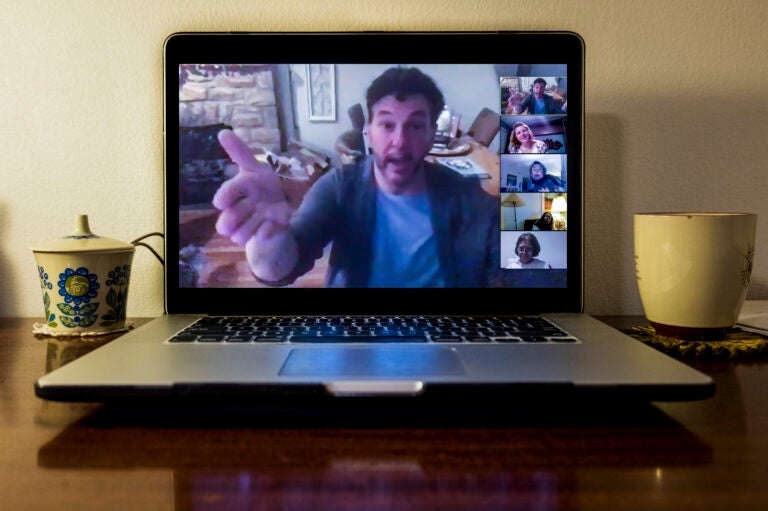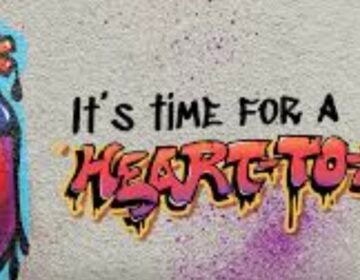Music therapy brings solace to COVID-19 patients and healers

Tom Sweitzer hosts a weekly music therapy group via Zoom for other COVID-19 survivors dealing with lingering symptoms. "We get to know each other through the music," says one participant. "I think that was a really intuitive and wonderful way to connect us." (Michele Abercrombie/NPR)
Tom Sweitzer knows firsthand how social isolation and loneliness are real side effects of living through a pandemic — just as mental health professionals have warned. After he tested positive for the coronavirus last July and recovered from the worst of his initial symptoms, Sweitzer joined a COVID-19 support group on Facebook to help him deal with the condition’s lingering effects.
As he watched people join “by the hundreds every day,” he decided to start another support group where he could incorporate his skills as a music therapist.
Music therapy treatments, tailored to each patient’s needs, can involve creating, singing, moving to and/or listening to music in ways that have been shown to promote physical and psychological healing. Research has shown the reduction in pain and stress from such treatments can be profound.
Through his Virginia-based company A Place To Be, Sweitzer mostly works with children and adults who have disabilities and traumatic brain injury. “I’m really using music for uplifting the emotions,” he explains, “for redirecting and reflecting and working through the pain that they’re having emotionally.”
When the pandemic hit, Sweitzer moved his practice online. He also made short, guided videos for his patients and their families to view and use on their own.
At 48 years old, Sweitzer considers himself pretty fit.
“I teach a Zumba class,” he says. “I walk my dog 5 miles a day. And I’ve been singing since I’ve been 5 so my lungs are in really good shape” — but not, he discovered, good enough to easily fend off this virus. “Even with these lungs that I felt were very strong, I was down for the count.”
By his third day in the hospital, Sweitzer says, “I still couldn’t get out of bed.” So, he practiced what he preaches and gave himself music therapy treatments that included, he says, “long breathing exercises — you know, very deep breath in, expanding the lungs, and then breathing out.”
The weekly support group Sweitzer has since started for other COVID-19 survivors coping with lingering effects of their illness is free and takes place via Zoom. In addition to breathing exercises and movement, they listen to music and sing together in each hour-long session.
Susanne Berman, one of the group regulars, learned about Sweitzer from her doctor in New York.
“I was excited about it, because I had been so isolated — that I had an opportunity to connect with other people that were like me,” says Berman. One of the things Sweitzer said that rang true to her: “We can all understand each other better when we’ve heard each other’s music.”
Even though Berman and the others on the Zoom sessions are complete strangers, “they have a better sense of where I’m coming from and what resonates with me in that moment,” says Berman. “And we get to know each other through the music — I think that was a really intuitive and wonderful way to connect us.”
Zoom isn’t the best venue for making music together Berman admits, so group members often mute themselves as they sing along.
“You know, when somebody else is talking over someone else, — or in the background, people making noise — all of that filters in when you’re not muted,” Sweitzer says. “And here we’re trying to sing a song. And so you’re hearing like a little bit of this person, maybe a little bit of that person. And it’s just very choppy.” The group emphasizes participation, not performance.
“Not everybody actually was a very good singer, myself, probably included at this point. So it was entertaining from that perspective,” Berman says.
Laughter is key to the weekly sessions, too.
“I’m a big believer in joy,” says Sweitzer. “Music therapy is a clinical and therapeutic tool, but one thing music does for a lot of individuals is it brings joy.”
Patients with COVID-19 aren’t the only ones in need of joy amid the pandemic. Filippo Giordano, a music therapist with the University of Bari School of Medicine in Italy, says the doctors and nurses in a hospital’s coronavirus unit in northern Italy were also “suffering from loneliness, anxiety, fear, fatigue, sleep disorder,” when the pandemic took hold there last year.
So Giordano and a team of researchers conducted a small, five-week study on the effects of music therapy as a support intervention “to reduce stress and improve [the] wellbeing” of 34 of these front-line health workers. They measured the healers’ levels of “tiredness, sadness, fear and worry” before and after weekly music therapy interventions, and found significant improvements after music therapy.
Because of COVID-19 restrictions, the research was conducted remotely. The health workers were sent customized music playlists lasting 15-20 minutes — each identified as “Breathing,” “Energy” and “Serenity” — along with detailed listening guides and questionnaires. Giordano and his team of music therapists followed up with weekly check-ins by phone.
Giordano believes music therapy can be an important “complementary” intervention to other forms of psychological therapy because it is “more direct and more immediate.”
He’s now giving music therapy treatments in-person to COVID-19 patients in intensive care and studying the impact. He hopes to have the first results in May, and says he’s already encouraged by what he’s seen so far. By focusing on positive sounds and imagery, Giordano says, the sessions allow patients to “go away from the intensive care unit” emotionally — “to be in another place.”
Meanwhile, Sweitzer is finding music therapy a particularly helpful approach for COVID long-haulers like himself.
“I still have some neurological damage. I can tell you my memory is not at all what it used be before COVID,” he says.
“This theory that we have as music therapists, you know, [is that] the brain is so plastic and it’s so moldable and flexible. And we know that music is this portal — this instrument that the brain connects with,” he says.
As both a music therapist and a COVID-19 long-hauler, Sweitzer says he’s using that instrument for himself as much as he is for others.
9(MDAzMzI1ODY3MDEyMzkzOTE3NjIxNDg3MQ001))


![CoronavirusPandemic_1024x512[1]](https://whyy.org/wp-content/uploads/2020/03/CoronavirusPandemic_1024x5121-300x150.jpg)


